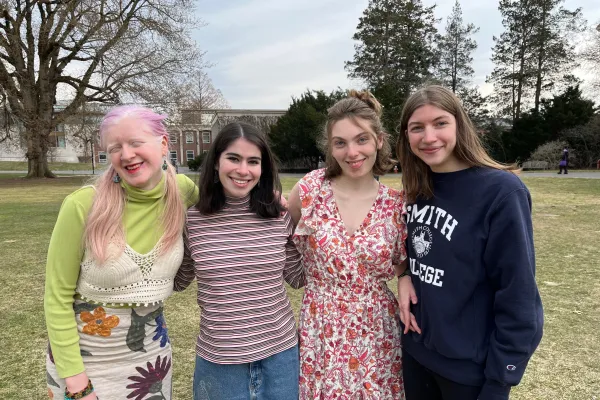A New Voice for Students With Disabilities
Campus Life

Published March 29, 2023
When Arden Grim ’26 went to her first student activities fair on campus last fall, she searched in vain for an organization for students with disabilities.
“I was walking around thinking, ‘Where’s the table? Where’s the table?” says Grim, who has cerebral palsy and epilepsy. “I heard there had been a group in the past, and I was surprised when I couldn’t find one.”
Filling that gap became her mission. In December, Grim and three fellow Smithies she met through the Accessibility Resource Center founded Dis-Organizing, a student advocacy and support group “open to all who care about disability justice.”
The group’s name is both a pun and a call to action, says Ariel Benjamin ’25, another founding member. “To disorganize means to disrupt systems and orders,” she explains. “We want people to understand the obstacles disabled students are facing, and we want to build coalitions and engage with others on campus to make lasting change.”
Benjamin’s own experience managing a chronic illness and ADHD convinced her of the need to revive student-led organizing around disability issues at Smith. “I really had to struggle to get learning accommodations,” says Benjamin, who deferred admission to Smith for a year for medical reasons. “I wasn’t prepared for some of the barriers. And I realized there needed to be more student involvement and a voice.”
Currently, one-third of students at Smith receive accommodations through the Accessibility Resource Center. Yet, despite those numbers, Dis-Organizing members say many students with disabilities still feel unrecognized by the larger campus community.
“I’ve asked myself many times, ‘do I belong here?’” says Una Fonte ’26, who is legally blind. “Being disabled is already a lot of work. In this group, you can come and be your full self without having to explain or justify anything.”
In bi-weekly Zoom meetings, participants have a chance to share their experiences, and brainstorm ways to make the campus more welcoming to students with disabilities, including improving physical spaces and increasing awareness of varied student identities. Working committees are focused on issues including affinity spaces, faculty communications and college COVID policy.
Dis-Organizing maintains a lively Instagram presence and a collective decision-making structure that aims to engage all members in the work of improving access and building community at Smith. This semester, the group has hosted craft-making sessions and helped promote medical self-advocacy workshops sponsored by the Schacht Center for Health and Wellness.
A starting point for organizing is recognizing the emotional burden that students with disabilities often carry while navigating daily life at Smith.
While the college provides numerous resources for students with disabilities, “you have to ask for them, which means you have to be aware of them,” notes Olivia Seker ’26, who was diagnosed in high school with a rare autoimmune disease that causes pain and fatigue.
“So many of my professors are accommodating and willing to help,” she adds. “But still, it can be hard when your condition is their first impression of you.”
As co-chairs of Dis-Organizing’s Advocacy and Community Outreach Committee, Seker and Grim have been working with the Jandon Center for Community Engagement to create more training and volunteer opportunities for Smithies with disabilities—including the possibility of visiting area K-12 schools to share their experiences with younger students.
By advocating for issues such as better access to health care appointments and more classroom learning aids, Dis-Organizing hopes to effect changes that will benefit everyone at Smith.
“Universal design is really critical,” says Benjamin, referring to the concept of making systems accessible to people with the widest possible range of abilities. “We have able-bodied people in the group who are there because they’re interested in these issues and how we can make a bigger community of care.”
Raising awareness is key, group members say.
“I keep coming back to the activities fair,” notes Grim. “That table needs to be there.”
Students interested in joining Dis-Organizing can email Benjamin, Fonte, Grim or Seker to be added to the mailing list and shared Google drive.
Four founding members of Dis-Organizing (from left) Una Fonte ’26, Ariel Benjamin ’25, Olivia Seker ’26 and Arden Grim ’26.